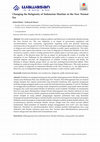Papers by Nadirsyah Hosen
The UN 'Faith for Rights' framework aims to foster the development of peaceful societies that uph... more The UN 'Faith for Rights' framework aims to foster the development of peaceful societies that uphold human dignity and equality for all and where diversity is not just tolerated, but fully respected and celebrated. Community leaders, politicians, and civil society groups are instrumental actors in speaking out against intolerance, discrimination, and hate speech. Notably, religious or belief leaders can play a crucial role in translating 'faith' into the language of 'rights' and vice versa, thereby engaging their considerable influence over the hearts and minds of millions of people to defend diversity, peace, and freedom. Ultimately, States must protect freedom of religion or belief for everyone, everywhere and at all times-and one clear step towards realisation of that goal is to abolish the death penalty for offences against religion.
Asia-Pacific journal on human rights and the law, 2002
Routledge eBooks, May 20, 2016
Australian international law journal, 2008
Review(s) of: Indonesia: Law and Society, by Tim Lindsey (ed), The Federation Press, 2nd Edition,... more Review(s) of: Indonesia: Law and Society, by Tim Lindsey (ed), The Federation Press, 2nd Edition, 2008, ISBN 9781862876927, Hardcover; 9781862876606, Paperback, AU$99, 752 Pages. Includes footnotes.
European Journal of Law Reform, 2003
... Among others, Attorney General Andi Ghalib, also strongly rejected the idea of such a Commiss... more ... Among others, Attorney General Andi Ghalib, also strongly rejected the idea of such a Commission. ... since his office was ready to fight and combat corrup-tion.13 He could not agree to a committee that had the same powers as his own office, 12 Habibie Setuju Komisi Korupsi ...
Cambridge University Press eBooks, Aug 2, 2010
[extract] While Indonesia has had experience in dealing with the use of emergency powers for more... more [extract] While Indonesia has had experience in dealing with the use of emergency powers for more than fifty years, it has had to face severe problems that have challenged its goals of national resilience, development and, more importantly, the absence of the rule of law. The focus of my chapter is the tensions inherent between emergency powers and the rule of law in Indonesia, particularly in the post-Suharto era.
Nordic Journal of International Law, 2003
Following the resignation of President Soeharto in May 1998, political and civic leaders, along w... more Following the resignation of President Soeharto in May 1998, political and civic leaders, along with governmental of cials, began the process of developinga new political system. The most important step was to create a new legal framework for early national elections. New political laws governing elections, political parties and the structure of legislative bodies were signed by President B.J. Habibie on 1 February 1999. The article examines the three 1999 political laws at three levels: political and legal processes, content and implementation. The article argues that those laws were a re ection of political compromise and, therefore, did not meet demands for genuine reform: promoting good governance and the rule of law.

Oxford University Press eBooks, Feb 16, 2012
This chapter focuses on the presidential system of Indonesia. The amendments to the 1945 Constitu... more This chapter focuses on the presidential system of Indonesia. The amendments to the 1945 Constitution have transformed the constitution from a vague and incomplete document rooted in the antidemocratic political philosophy of organic statism into a more coherent, complete, democratic framework for a presidential system with significant separation of powers and checks and balances. The very fact that Indonesia is the largest Muslim country in the world did not lead Islamic political parties to propose that Indonesia should become an Islamic state. According to the amendments, Indonesia remains a republic, with a presidential system and three branches of government. The chapter discusses the form of the Indonesian state, method of election, requirements, accountability, and relationship among the executive, the parliament, and the judiciary.
Routledge eBooks, Dec 14, 2020
Cambridge University Press eBooks, Apr 17, 2014
Cambridge University Press eBooks, Dec 7, 2017

Wawasan: jurnal ilmiah agama dan sosial budaya, Jul 31, 2021
This study examined new religious patterns and behaviours in Indonesian Muslims during the New No... more This study examined new religious patterns and behaviours in Indonesian Muslims during the New Normal era. This new religiosity is an impact of government regulations and recommendations from community organisations regarding social and physical distancing restrictions due to the spread of Covid-19. This study used a sociological approach to analyse changes in religious and social behaviour of Indonesian Muslims in public spaces qualitatively. This study found five main aspects that indicate a new form of religiosity for Indonesian Muslims in the New Normal era, namely; a shift in worship practices from a public space to a private space, a decrease in the capacity of the physical space that has an impact on decreasing the routine of worship, the emergence of new challenges for the authorities and public policy to prepare an area for more personal religious activities, the disappearance of symbolic worship practices, and finally, the blurring of abangan Muslim groups based on waqi'iyah (contemporary/contextual) ijtihad. These findings are analysed using the theory of public space from Jurgen Habermas's. This study proposes a new pattern of religiosity for Indonesian Muslims in the New Normal era, i.e., the adjustment of Shari'a by way of independent legal reasoning to maintain a wider maslahat, public welfare.











Uploads
Papers by Nadirsyah Hosen
While the form of technology may have changed from symbolic regimes to ICT, from icons to apps, the interactions between humans and technics illustrate many persistent forms and social mechanisms, from architecture to ritual and performative enunciation. These technologies and mechanisms will be explored intensively over 3 days by participants from law, sociology, philosophy, semiotics, political sciences, architecture and other disciplines.
Papers and discussions may address urban planning, ICT, court architecture, regulation of food or other vital human needs, the settings and techniques of religious deliberation and dispute resolution, or other interfaces between social order and technologies. Discussion will be informed by theory and research, and will work towards ethical and practical needs and consequences.